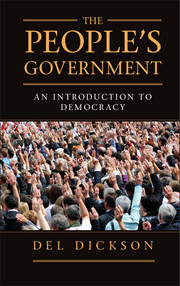Book contents
- Frontmatter
- Contents
- Acknowledgments
- Prologue
- 1 Liberty and Freedom
- 2 Freedom or Liberty?
- 3 Rights
- 4 Participation and Representation
- 5 Inclusion
- 6 Equality
- 7 Power
- 8 The Case against Democracy
- 9 The Case for Democracy
- 10 Building a Stable Democracy
- 11 Three Misconceptions about Democratization
- 12 How Democracies Die
- 13 How Democratic Is the United States?
- Glossary and Biographies
- Bibliography
- Index
- References
6 - Equality
Published online by Cambridge University Press: 05 August 2014
- Frontmatter
- Contents
- Acknowledgments
- Prologue
- 1 Liberty and Freedom
- 2 Freedom or Liberty?
- 3 Rights
- 4 Participation and Representation
- 5 Inclusion
- 6 Equality
- 7 Power
- 8 The Case against Democracy
- 9 The Case for Democracy
- 10 Building a Stable Democracy
- 11 Three Misconceptions about Democratization
- 12 How Democracies Die
- 13 How Democratic Is the United States?
- Glossary and Biographies
- Bibliography
- Index
- References
Summary
After inclusion, the next question is whether everyone participates on an equal basis, or whether some people are more equal than others. There are two distinct types of equality to consider: political-legal equality and socioeconomic equality.
Liberal democrats focus on political-legal equality, which is closely tied to individual liberties, including rights to think, speak, and organize, and equality before the law. Most liberals believe that people are born to equal rights, and assume that equality is the natural state of things. Because equal rights are, in effect, a preexisting condition, government does not have a significant role to play in creating or maintaining equality, especially with respect to socioeconomic rights.
Government has a responsibility to ensure that everyone has equal opportunities and equal justice, but otherwise should leave people alone to make their own way. If people choose well and prosper, then they have the right to the fruits of their labor. If they choose poorly and fall behind, then they must take responsibility for their actions and accept the consequences.
Equal opportunity does not ensure equal results. Although people might be born equal, they are destined to unequal outcomes, and this is OK. Economic inequalities, in particular, do not violate the liberal sense of justice, unless they are the result of some fundamental unfairness, such as fraud, duress, or coercion.
Free democrats also believe in political-legal equality, but they are more likely to go the extra mile to demand socioeconomic equality in the form of a social democracy. In contrast to liberal democrats, most free democrats believe that people are naturally unequal at birth. Inequality is the natural state of things, because we are all born to different circumstances and different fortunes. Equality is a purely human construct, tied to freedom and community. Citizens in a free society are equal if and only if people choose to treat each other as equals.
- Type
- Chapter
- Information
- The People's GovernmentAn Introduction to Democracy, pp. 64 - 79Publisher: Cambridge University PressPrint publication year: 2014



